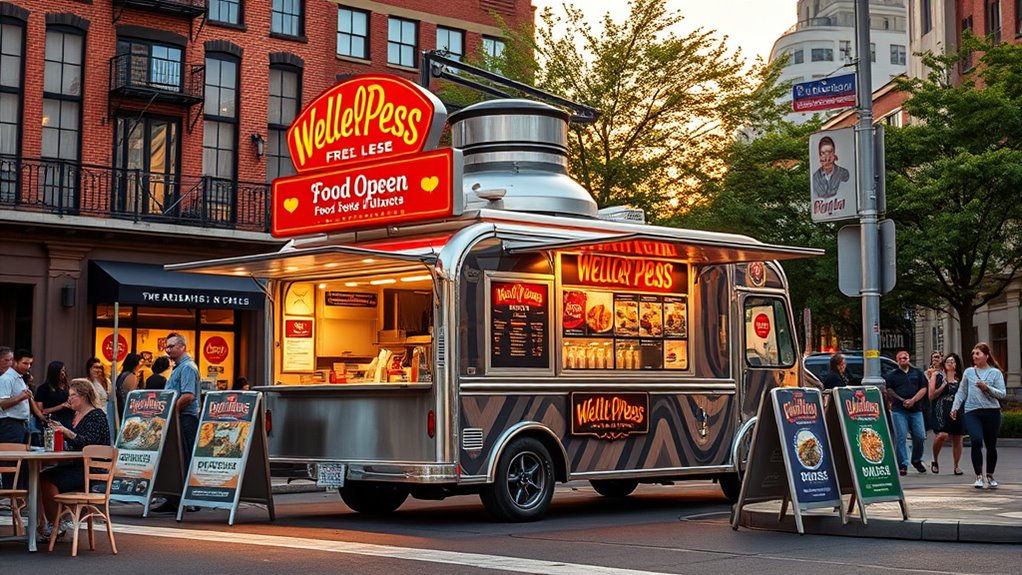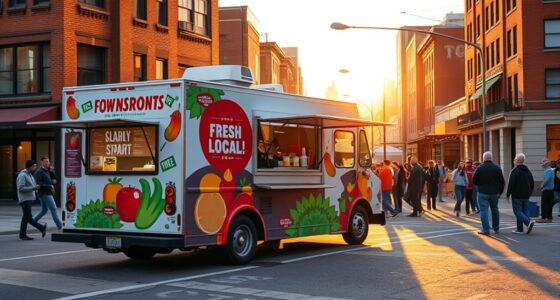To open a food truck in Atlanta, you’ll need to complete an online application on ATLCORE, pay initial fees of about $495, and pass background checks. Focus on high-traffic locations like parks or busy streets, and verify your menu complies with health standards by using approved ingredients and proper storage. You’ll also need a licensed commissary and effective marketing strategies like social media and local events. Keep exploring to learn how to successfully launch and grow your food truck business.
Key Takeaways
- Obtain necessary permits through ATLCORE, including health, business, and vendor permits, with initial fees around $495 and renewal costs of $125.
- Select high-traffic, visible locations like busy streets, parks, or event venues, ensuring compliance with zoning laws.
- Develop a compliant menu with proper food sourcing, labeling, and safety standards, aligned with Georgia and FDA regulations.
- Secure a licensed commissary for food prep and storage, with costs from $1,000 to $1,500 monthly, and ensure compliance with health and safety standards.
- Promote your food truck via social media, participate in local events, and implement loyalty programs to attract and retain customers.
Navigating Permit Requirements and Costs in Atlanta

Finding permit requirements and costs in Atlanta can seem complex, but understanding the process makes it manageable. You’ll need to apply online through ATLCORE, the city’s business license portal. Your application should include a vendor permit form, a valid ID, Georgia sales tax ID, health permits from Fulton or DeKalb County, a business occupation tax certificate, and 360-degree photos of your truck. Complete your application within 30 days. For private property vending, you also need zoning approval, notarized permission, and affidavits. Initial fees total $145, covering permit, background check, and fingerprinting, plus a $350 reservation fee. Renewals cost $125 plus the same reservation fee, with applications due by February 28. Payments are non-refundable, and background checks are conducted by Atlanta Police. It’s important to stay aware of pinball machine regulations and local ordinances to ensure full compliance. Missing deadlines may lead to penalties or rejection.
Choosing Prime Locations for Your Food Truck
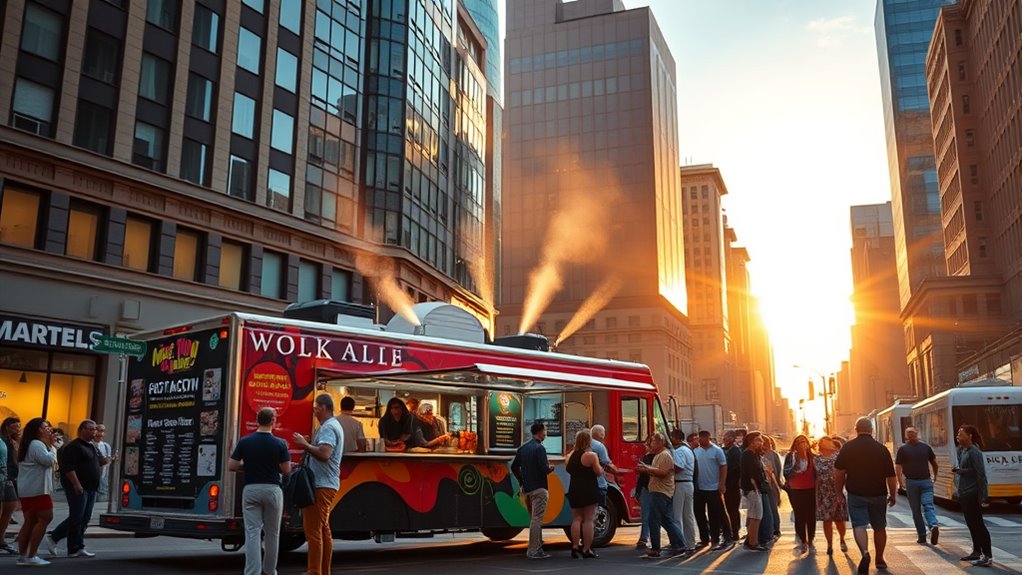
Choosing the right locations for your food truck can make or break your business. Focus on high foot traffic areas like busy streets, parks, and event venues during peak hours to maximize exposure. Confirm your spot is visible and accessible, close to transit or parking. Be mindful of the competitive landscape—avoid oversaturated areas unless your cuisine offers a unique twist. Match your location with your target audience’s habits and preferences to boost demand. Also, verify compliance with local zoning laws and permits.
| Location Type | Best Time to Operate | Key Considerations |
|---|---|---|
| Downtown Atlanta | Lunch & evening rush hours | High office worker density |
| Parks & Recreation | Weekends & holidays | Ample foot traffic |
| Event Venues | During festivals & events | Temporary but crowded |
| Hospital Campuses | Lunchtime & shift changes | Regular, dependable traffic |
| University Areas | Class change times | Student & staff presence |
Designing a Menu That Meets Health and Regulatory Standards
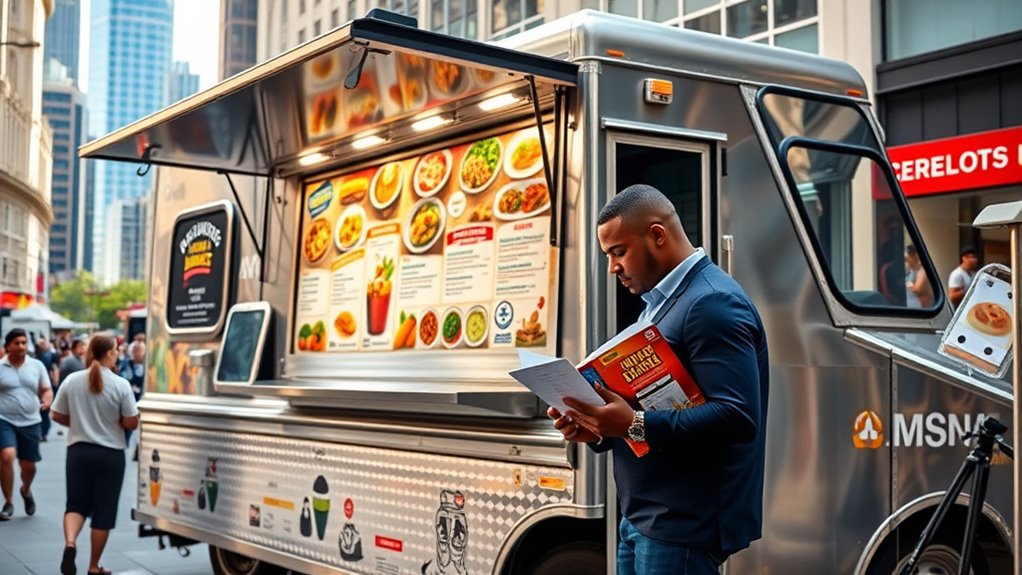
Designing a menu that meets health and regulatory standards requires careful planning to guarantee all food items comply with state and local laws. You need to submit a detailed menu to the health department during permit applications, ensuring each item follows Georgia Food Service Rules and Regulations, updated as of February 2025, which incorporate 2022 FDA Food Code requirements. Use only approved food sources, maintain proper storage temperatures, and implement routine cleaning schedules to prevent contamination. Including proper documentation is essential for smooth inspections and ongoing compliance. Include a variety of options catering to dietary restrictions like gluten-free and vegetarian choices, using fresh, local ingredients when possible. Clearly label allergens and nutritional info, and incorporate portion control. Proper documentation, ingredient lists, and staff training are essential for smooth inspections and ongoing compliance. Ensuring compliance with local health department standards is also crucial to avoid delays or violations during the inspection process.
Establishing a Commissary and Base of Operations

Setting up a reliable commissary and base of operations is a vital step in launching your food truck business in Atlanta. A commissary is a licensed kitchen where you can handle food prep, storage, and waste disposal, and it’s a requirement for permit approval from local health authorities. You’ll need to submit a commissary agreement along with your food truck permit application. Commissaries must meet health and safety standards, often undergoing unannounced inspections, and typically charge $1,000 to $1,500 monthly. In Atlanta, they must be within reasonable distance, have water refill stations, waste disposal, and electrical hookups. You’ll also need to maintain proper documentation, including permits and agreements, and comply with fire safety regulations to guarantee smooth operations. Additionally, commissaries are inspected regularly to ensure ongoing compliance with health standards, which helps maintain your business’s good standing with regulators. When selecting a commissary, consider factors such as location proximity, available amenities, and flexibility in scheduling to optimize your daily operations.
Effective Marketing Strategies to Grow Your Food Truck Business
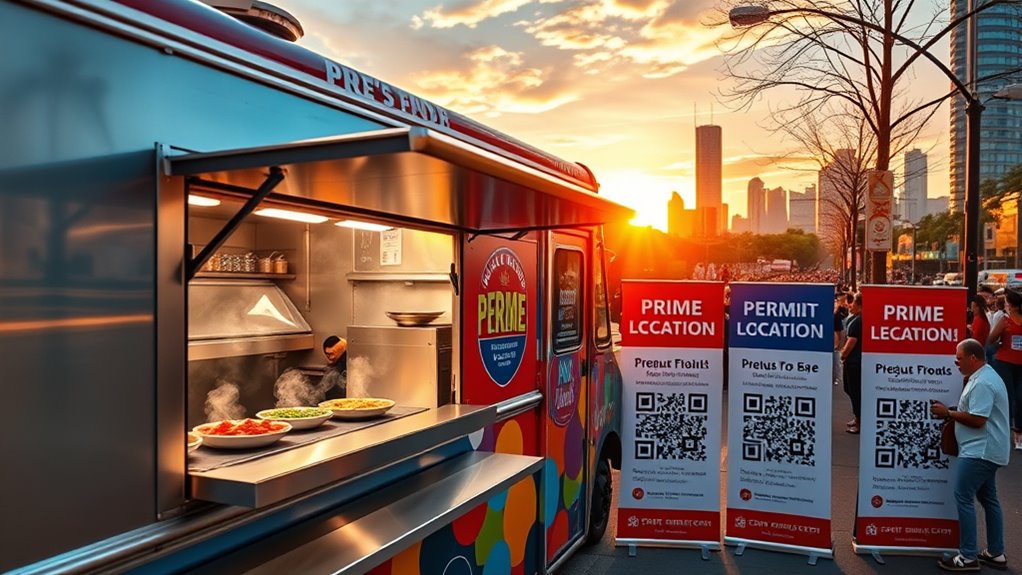
To effectively grow your food truck business in Atlanta, leveraging a strong marketing strategy is essential. Social media is a powerful tool—68% of food truck owners use platforms like Facebook, Instagram Reels, TikTok, and YouTube Shorts to boost visibility and engagement. Facebook leads with 75% activity, and campaigns can increase sales by 20%, with customers spending about 15% more when engaged online. Using geotargeted ads and augmented reality helps customers find your truck easily. Participating in local festivals and events—80% of trucks do this—can boost sales by up to 50 and build local buzz. Loyalty programs, personalized promotions, and menu innovation tailored to current trends also foster repeat business and increase revenue. Over 50% have implemented loyalty programs, resulting in a 30% increase in repeat visits. Incorporating digital marketing strategies that include online reviews and influencer collaborations can further enhance your visibility in Atlanta’s competitive food scene. Combining these strategies maximizes your marketing impact in Atlanta’s competitive food scene.
Frequently Asked Questions
How Long Does the Permit Approval Process Typically Take in Atlanta?
The permit approval process in Atlanta usually takes 2 to 4 weeks after you submit a complete application. You should plan for possible delays if multiple departments review your paperwork or if there are zoning or health inspection issues. To avoid setbacks, apply at least 45 days before you want to start operating, and guarantee all documents are accurate and complete to speed up the process.
Are There Any Restrictions on Operating Hours for Food Trucks in Atlanta?
Think of the operating hours like a tightrope you need to walk carefully. In Atlanta, you’re generally limited to 7:00 a.m. to 10:00 p.m., with some extending to midnight, depending on the location. Fulton County permits may restrict you to 6:00 a.m. to 8:00 p.m., or until 10:00 p.m. on weekends. Always stay within permitted hours to avoid penalties and keep your food truck rolling smoothly.
Can I Operate My Food Truck on Private Property Without a Permit?
You can’t operate your food truck on private property without a permit. Atlanta requires written consent from the property owner, notarized permission, and approval from the zoning enforcement division. You also need to meet health department regulations and obtain a mobile food vendor license. Skipping these steps can lead to fines or legal issues, so always verify you have all necessary permits and permissions before starting operations.
What Are the Best Seasonal Strategies to Maximize Sales in Atlanta?
Like a weather vane shifting with the seasons, your strategies should adapt. Focus on seasonal menu items with local ingredients, promote holiday specials, and partner with local events. Use vibrant signage and social media to attract crowds, and position your truck at high-traffic seasonal sites. Prepare inventory in advance, train staff for quick service, and consider loyalty programs to keep customers coming back, maximizing sales year-round.
How Do I Handle Health Inspections and Compliance Issues Proactively?
To handle health inspections proactively, keep your truck spotless, with all equipment at correct temps and handwashing stations fully functional. Stay organized with permits, inspection reports, and health department communications. Regularly perform safety checks, maintain proper documentation, and train staff on sanitation protocols. Engage with inspectors openly, address feedback promptly, and stay ahead of renewal deadlines. This approach guarantees compliance and reduces surprises during inspections.
Conclusion
Starting your food truck in Atlanta might seem intimidating, but with the right permits, prime spots, and a solid marketing plan, you’re set for success. Keep your eye on the prize and don’t get discouraged by setbacks—they’re just part of the journey. Remember, Rome wasn’t built in a day, so stay persistent and adapt as you go. With determination and smart planning, your food truck dreams can become a tasty reality.
